NASUWT Representatives
NASUWT Representatives
NASUWT Representatives
You also want an ePaper? Increase the reach of your titles
YUMPU automatically turns print PDFs into web optimized ePapers that Google loves.
www.nasuwt.org.uk23Sometimes you may have to advise members that it would be a mistake to take the matterup if there is little or no chance of success. Sometimes you will decide that, although thegrievance is genuine, it is not something that the employer can solve and you may have toadvise the member to seek further advice. Sometimes the complaint is about the behaviourof a fellow worker. Such problems are always difficult to resolve and you may want to discussthe matter with the parties involved rather than take up the issue with management. And, ofcourse, some problems are both genuine and capable of being resolved by the employer ormanagement. You may wish to take these up with your headteacher.By law, every school must have a written grievance procedure that lays down the processby which problems of this sort can be dealt with.There is, invariably, an informal stage to the procedure where you will have an opportunity tosolve the problem in discussion with the member(s) and the school/college management.Where possible, problems are best dealt with at this informal level. Of course, the problemmight be that the member has been accused by the management of some misconduct. Inthis case, the member may be subject to discipline.By law, all schools must have a written disciplinary procedure that will lay down the ‘rules’of procedure.Finally, the problem, although raised by an individual member, may have implications forother staff in the school. In this case it becomes a collective issue and may need to be thesubject of consultation/negotiation between the <strong>NASUWT</strong> <strong>Representatives</strong> and theschool/college management. Alternatively, it may be a collective issue that you can organisea campaign around. Once you have a clear idea of the problem, you can then begin to decidewhat information you need to gather in order to tackle it.Information is crucial when handling members’ problems. Your first source ofinformation will be from the members themselves. You may have to interviewindividuals to establish the facts or you may have to hold meetings ofmembers to ascertain their views.Much of the basic information you need can be gathered from documents (e.g. the Blue Bookand the Burgundy Book). You need either to have copies of these in your file or easy accessto them within your school.Agreements (at school, local or national level) are another vital source of information. Atschool level, for example, there might be an agreement about the distribution of ‘duties’amongst the staff and at local level there might be an agreement that improves upon nationalarrangements for sick leave.Don’t forget custom and practice. These are arrangements that may have continued foryears without ever being written down. You can consider such arrangements as unwrittenagreements that management should not change without prior negotiation with the tradeunions.Make sure you know what the problem is. You might also wish to consider whether themember has any legal employment rights covering the matter in dispute.There are also legal rights relating to health and safety. In both individual and collectiveissues, union policies are an important source of information. Don’t worry if you do not haveall of this information at your fingertips. You can turn to the <strong>NASUWT</strong> for detailed informationand advice. Contact your Local Association Secretary or Regional Centre.Background Information


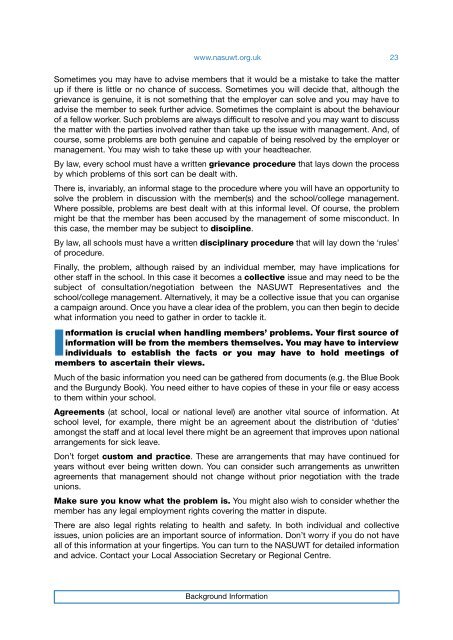
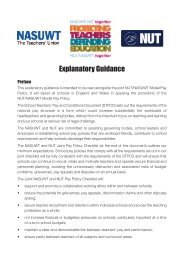

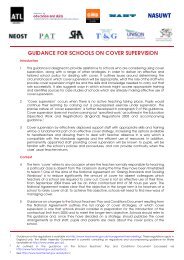
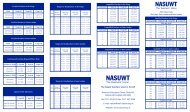
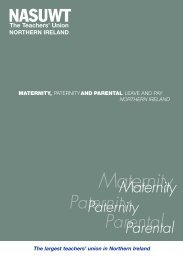

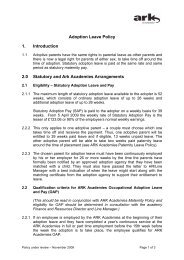
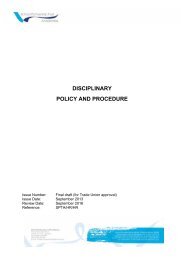
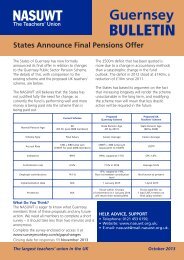
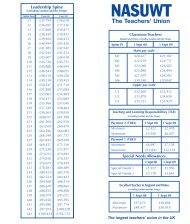

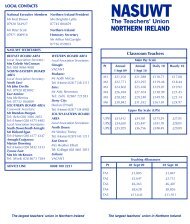
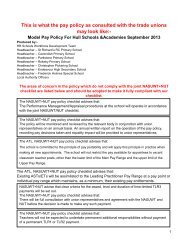
![Salaries (London & Fringe) 2012-2013 [pdf - 281 kb] - NASUWT](https://img.yumpu.com/47816007/1/190x112/salaries-london-fringe-2012-2013-pdf-281-kb-nasuwt.jpg?quality=85)